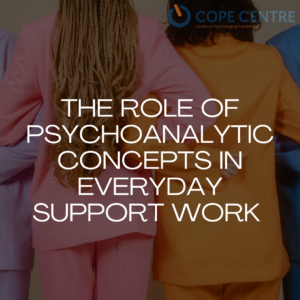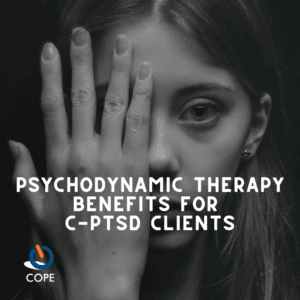Psychodynamic Psychotherapy helps clients to regain balance in their lives and take ownership of their wellbeing.
Psychodynamic Psychotherapy, in this regard, extends beyond immediate therapeutic objectives, exploring the root causes of emotions, thoughts, and behaviours linked to traumatic experiences in childhood. By delving deeper into individual functioning, attachment styles, and fostering self-awareness, this approach can catalyse meaningful change and promote enduring recovery for participants.

What is Psychodynamic Psychotherapy?
It is an evidence-based and efficient method that recognises and honours the individual needs of participants, facilitating their journey towards reclaiming agency and self-empowerment to enhance their overall functionality.
It benefits and results in
- Reduction in anxiety and depression symptoms
- Boosted self-esteem
- Better control over aggression and negative emotional expressions
- Enhanced interpersonal skills and relationships
- Improved capacity to achieve long-term objectives
- Greater effectiveness and fulfilment in the workplace
Psychodynamic techniques support
- Focus on affect and expression of emotion
- Exploration of attempts to avoid distressing thoughts and feelings
- Identification of recurring themes and patterns
- Discussion of past experiences (developmental focus)
- Focus on interpersonal relations
- Focus on the therapy relationship
- Exploration of fantasy life
The findings suggest that the advantages of psychodynamic therapy are lasting rather than temporary, extending far beyond mere symptom relief. For numerous participants, this form of therapy can cultivate inner strengths and abilities, leading to a more vibrant, liberated, and satisfying life. It is an ideal approach for NDIS participants to help them reach their goals.

Elisabeth Eitelberger
Psychodynamic Psychotherapist & Arts Therapist AThR
Elisabeth is a registered Psychodynamic Psychotherapist (Clinical Counsellor) with PACFA and has been part of our clinical team for the past few years as a professionally trained Arts Therapist (ANZACATA).
With her new qualification, she will also provide individual talk therapy for clients facing mental health challenges, behavioural issues, and chronic pain under NDIS’s clinical counselling.
Elisabeth approaches therapy through a trauma-focused perspective, incorporating not only traditional talk therapy but also somatic and creative techniques, which can be particularly effective when verbal expression falls short.
Her work emphasises lifespan development and strategies for navigating challenging situations while seeking meaning in the present context.
Psychodynamic Psychotherapy, in this regard, extends beyond immediate therapeutic objectives, exploring the root causes of emotions, thoughts, and behaviours linked to traumatic experiences in childhood. By delving deeper into individual functioning, attachment styles, and fostering self-awareness, this approach can catalyse meaningful change and promote enduring recovery for participants.
Article by Elisabeth Eitelberger
COPE Centre of Psychological Enrichment
Visit us at 2 Lawrence Avenue, West Perth
📞 (08) 6556 6460
📧 [email protected]

